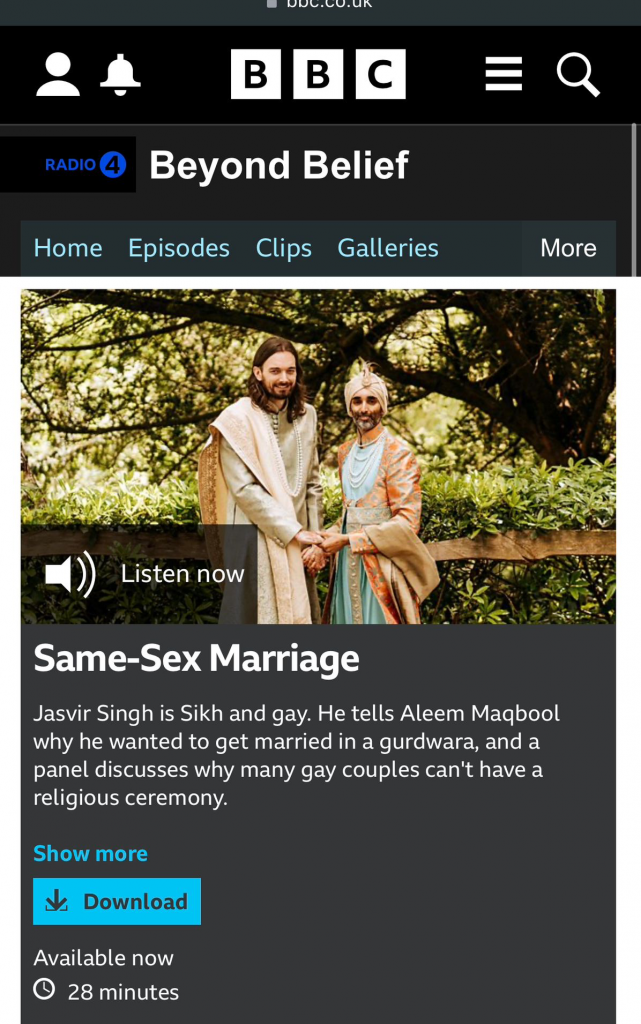
It is well documented and admitted by the BBC that they tried to prevent our Director, Lord Singh, speaking on Thought for the Day (TFTD) about Guru Nanak, the founder of the Sikh faith. He was also pressurised to minimise the contribution of Maharaja Ranjit Singh in promoting harmony and respect between faiths. Unbelievably, after a script of a talk on the martyrdom of Guru Tegh Bahadur had been agreed with the producer of the day, he was asked late in the evening to scrap it and talk about something else. He stood his ground and said that freedom of belief was important to the world of today, and he made it clear that if he was not allowed to talk about Guru Tegh Bahadur, there would be an empty chair in the studio next morning. Faced with this, the producer agreed to the talk going ahead. It was well received.
Our Director complained about the above, and other attempts to belittle Sikh teachings, and in the absence of an assurance that this would stop, he left the TFTD slot after 35 years of broadcasting which won him acclaim from all sections of society. His departure made front page news in the Times and was also the subject of an editorial highly critical of the BBC attempt to censor the tolerant and compassionate contributions of a nationally recognised broadcaster. Thousands of Sikhs signed a petition protesting the BBC attack on Sikh teachings, but to no avail.
Jasvir Singh, an occasional presenter on TFTD chose to remain silent during this flagrant attack on Sikh teachings. He was duly rewarded for his loyalty to the BBC, and made ‘the main Sikh contributor’ on TFTD. The BBC have now rewarded his silence during the attack on foundational Sikh teachings, giving him coverage on the BBC Radio 4 programme – Beyond Belief. They have promoted Jasvir’s gay identity and civil marriage to a non-Sikh. Jasvir tells the BBC that he and his husband received a blessing from a granthi, but went on, ‘could we get married in a gurdwara, sadly the answer was no’, indicating that’s what the couple had intended. The presenter then asks, ‘so why couldn’t Jasvir and his husband Nick have a wedding they wanted within the faith tradition that means so much to Jasvir?’
Sikhism does not condemn homosexuality and Jasvir is of course entitled to choose his lifestyle, but its peculiar that the BBC have described him as a ‘devout Sikh’. This is because Sikhism teaches the Sikh marriage ceremony or Anand Karaj, should be between a man and a woman for their mutual wellbeing, the upbringing of children, and service to the wider community. The Anand Karaj is not an inter-faith or same-sex ceremony.
It is a matter of real concern that after our Director presented the above view of marriage in Sikhism, with appropriate scriptural references to the BBC, it vainly sought others in the community who were unable to effectively articulate that Jasvir’s position on the Anand Karaj ceremony is not consistent with Sikh teachings. Whilst we condemn the threats that Jasvir has received for his sexuality from a fringe minority, Sikh teachings on Anand-Karaj are clear.
Urgent need
Religious broadcasting must have safeguards against attempts by Christian or other producers to belittle, smear or trivialise the teachings of other faiths. There is an urgent need for an Advisory Body to ensure personal prejudices of producers are not allowed to dilute mainstream teachings of other faiths, which should be respectfully and accurately presented in religious broadcasting.


 We have been overwhelmed by supportive messages for our Director following the front-page headline in The Times last month – ‘
We have been overwhelmed by supportive messages for our Director following the front-page headline in The Times last month – ‘